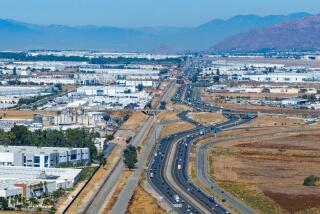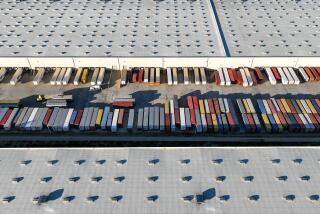Amazon looks to hire 2,000 new workers in Inland Empire

- Share via
Amazon is gearing up for a hiring spree in the Inland Empire.
The e-commerce giant plans to hire more than 2,000 full-time and part-time workers to staff two new facilities in Fontana and Jurupa. The new facilities, called “inbound cross docks,” launched operations earlier this month and are designed to receive cargo and sort merchandise to send to fulfillment centers, which handle customer orders.
Paul Granillo, president and chief executive of the Inland Empire Economic Partnership, said in a news release on Tuesday that the infusion of new jobs represented a “significant boost” to the local economy.
Granillo said in an interview that Inland Empire communities depend heavily on logistics jobs, since starting wages are typically higher than minimum wage. And the logistics sector was one of just three in the region that saw job growth in 2024, along with healthcare and government, he said.
“Amazon is probably our largest private employer and is important to the economic vitality of the region,” Granillo said.
The new Amazon jobs offer starting pay of $20.75 per hour and benefits such as healthcare, dental and vision coverage, a 401(k) with company match and up to 20 weeks of paid parental leave, according to Amazon spokesperson Carly Levy.
The new positions will be added to Amazon’s website in the coming weeks, she said.
Michael McCarthy, an adjunct professor of environmental analysis at Pitzer College had a less rosy view of the region’s freight and logistics sector. He said tariffs being pursued by the Trump administration don’t bode well for Inland Empire warehousing. And, he said, growth in freighting has slowed in the years since the pandemic boost, with warehouses seeing higher job vacancy rates.
“We are overly dependent on warehousing. Devoting such a large share of our land use to it and not diversifying our economy is a problem,” McCarthy said.
The opening of new facilities comes amid tensions over environmental impacts of industrial development in the region. Developers have pursued properties along Inland Empire freeways, demolishing neighborhoods to make way for industrial facilities to convert the area into a logistics corridor for e-commerce arriving in Southern California ports. Community activists and residents have pushed for limits on this type of development, which they say drives pollution, traffic congestion and other problems.
Last year Gov. Gavin Newsom signed a hotly contested bill that established new standards for building and design of industrial warehouses meant to protect the health of residents in surrounding areas. The legislation, which will go into effect in 2026, faced major opposition from those who saw it as a job killer, putting restraints on economic opportunity and infrastructure development.
More to Read
Inside the business of entertainment
The Wide Shot brings you news, analysis and insights on everything from streaming wars to production — and what it all means for the future.
You may occasionally receive promotional content from the Los Angeles Times.











